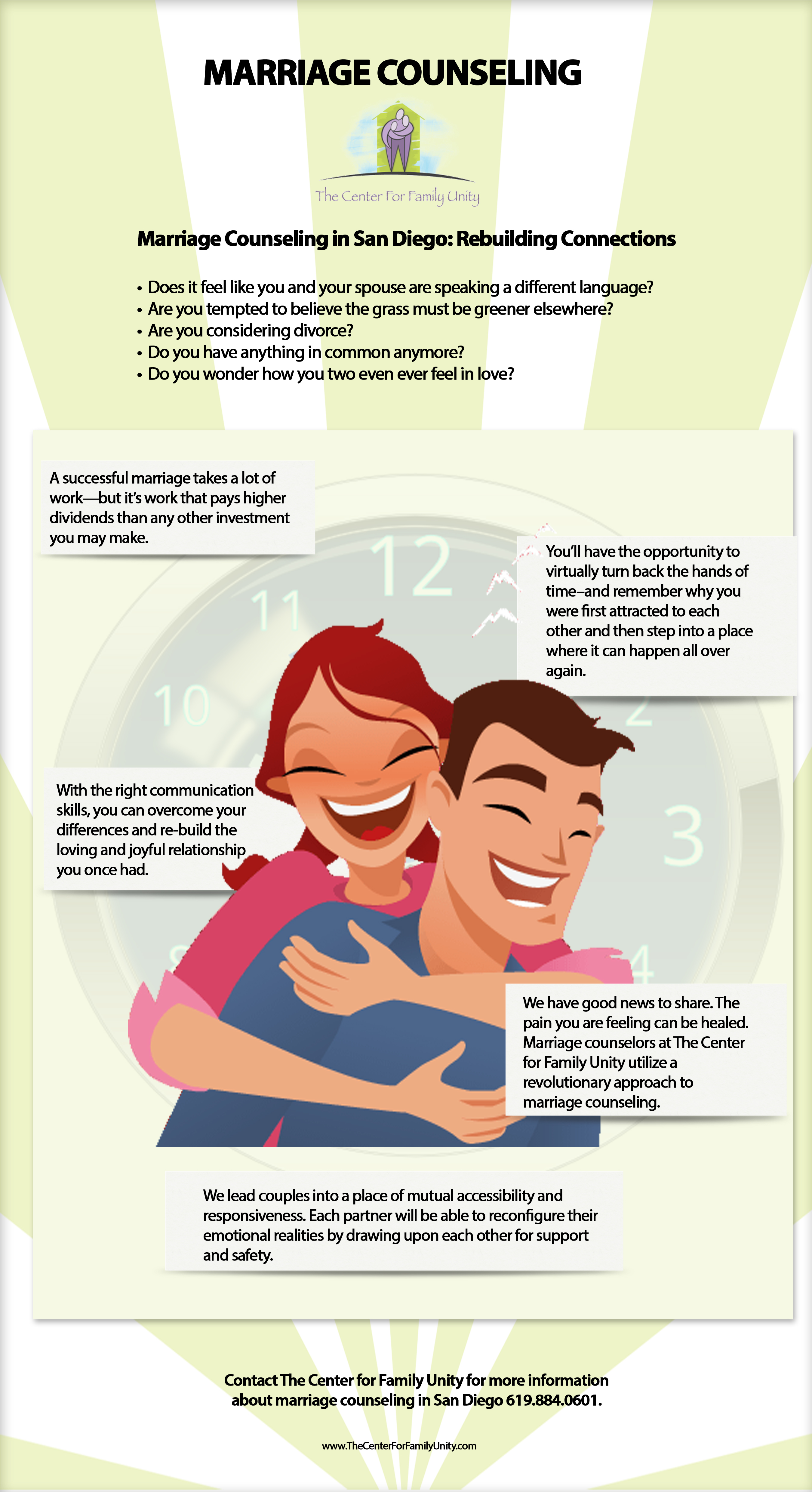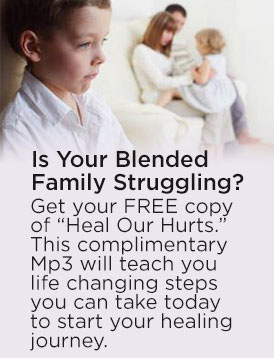Fix Common Marriage Problems with Marriage Counseling in San Diego
Marriage Counseling in San Diego can Save Your Marriage
Intimacy—Accept No Imitations
How and What to Reveal
Writer Pat Love asks, “What is intimacy?” and then answers her own question, “Into me, see.” It’s not that to be intimate you need be transparent, or that every thought, feeling or story must be shared with your partner—but intimacy flourishes in a climate in which it’s safe to disclose parts of your experience that cut closer and closer to your private self.
Sometimes, though, a longing for connection can lead to disclosing too much too soon, or telling a new partner more than he or she is ready to know or needs to know. In some cases it leads to opening up too much about ourselves or people close to us, when discretion might be the better choice.
Consider following the Rule of Three: Let a disclosure come to mind three times before sharing it, rather than saying everything exactly as it occurs. Those things that recur are the ones that really belong to the relationship.
Remember, time is a necessary part of the intimacy equation. The thrill and power of the first weeks of a passionate relationship encourage self-disclosure and lots of sharing, but no matter how strong the connection, some things can come to light only after trust has been built.
Intimacy with boundaries
Few words in our language are asked to carry as much weight as intimacy. Do a quick web search with intimacy as your keyword, and you are guaranteed to find a wide range of articles and hundreds of books offering advice on how to find and keep it, or deal with not having it. Peruse some of these and you’ll often find confusion about just what intimacy is.
Often it is used as a synonym for sex. TV hasn’t helped. How often have you heard lawyers in courtroom dramas ask a cornered witness, “Were you…intimate with the deceased?” in a tone that’s clearly not asking about the level of emotional honesty and trust in the relationship!
The usual culprit is the confusion of intimacy with fusion, a boundary-less merging with a partner that erases differences. That kind of longing leads to the romantic inflations and disappointments that litter the path of relationships and fuel dynamics that subvert true intimacy—one partner’s fear of being abandoned countered by the other partner’s corresponding fear of being engulfed.
Appoint your partner ‘guardian of your solitude’
The great poet Rilke advised a young friend: “It is a question in marriage…not of creating a quick community of spirit by tearing down and destroying all boundaries, but rather a good marriage is one in which each appoints the other guardian of his solitude, and shows him this confidence, the greatest in his power to bestow.”
Rilke’s comments, applicable to all committed partnerships, point to the mutual respect and clear-eyed seeing that form the basis for genuine intimacy. It’s built by going through difficult doorways: the moment of risk before bringing up a hard subject or the challenge of listening with openness to some honest feedback we’d rather not be hearing.
The importance of trust
If your relationships lack intimacy, look to see where trust has been broken; that’s the hole in the fence that needs to be patched first. Ask yourself how you’ve contributed to the lowering of trust, not just in big ways but in the small ones that communicate our attitudes. Are you available to listen without comment, despite strong feelings being stirred when you have disagreements? Do you allow your partner to express him or herself fully? Do you attempt to elicit a fuller range of feelings? And when they’re expressed, do you actually hear them or do you dispute them? Do you respond as you wish to be responded to? Do you talk when you need to? Is your feedback, even if expressing a resentment, couched in the language of “I” or with a finger-pointing “you?”
Watch out for old baggage
Intimacy is particularly vulnerable to the unexamined influences of our earlier lives, to our search in our partners for an ideal parent or attempts to recreate failed strategies of the past. Authentic contact with significant others can replace those fantasy aspects with the power of genuine meeting.
Check for little pockets of unconsciousness that may be blocking you or your partner from contact. Do you find yourself sounding “just like mother or father?” Is your partner behaving “exactly the way my ex behaved,” or accusing you of doing so? Have you awoken with dreams that merge your partner with someone from your past? If so, a conversation with a counselor at The Center for Family Unity can often help sweep away those old cobwebs.
Rilke’s advice ends with a reminder of the connection between intimacy and a healthy ability to maintain what’s separate: “Once the realization is accepted that even between the closest human beings, an infinite distance continues to exist, a wonderful living side-by-side can grow up, if they succeed in loving the distance between them which makes it possible to see each other whole and against a wide sky!”
Eager to learn more about healthy intimacy?
Contact The Center For Family Unity
619.884.0601
How to Make Sure our Second Marriage Doesn’t End Up Like Your First
Set your second marriage up for success with these steps.:
- Precaution: What’s the rush? If the statistics tell us you have an 85% chance of failure if you remarry less than two years after your divorce, why would we jump in so quickly? What’s your motive?
- Money: if we are in love and planning to marry eventually, it would be so much easier financially if we were to join households now.
- I learned so much from my divorce that I know what to accept and not accept
- I am a much better person with this partner. The kids benefit and there is less stress for all of us.
- I can’t wait because……( your answers)
- How much personal growth work have you done to ensure you don’t choose the same type of partner disguised in a different package?
- We suggest you attend a Keeping the Love You Find workshop to discover the patterns of connection you have made and how to discover the purpose of marriage.
- Divorce Care groups
- Personal counseling
- Preparation: Intentional dating
- Deepening the step parent/step child relationship
- Pre-Marital education and counseling
- Brief, skills-based educational programs for couples increase couple satisfaction, improve communication skills, reduce negative conflict and may prevent separation and divorce
- Possibilities:
- Strength based marriage and parenting
- Priority:
- Being each other’s safe harbor
- Quality time for just the two of you
- Negotiate household rules and parenting strategies
- Promise
- To look for the good in each other
- To work as a team
- To seek support in a crises
- To never, never use the D-word!
New Marriage/Family Therapist Joins The Center for Family Unity
In an effort to increase the resources available at our facilities,  The Center for Family Unity has announced the addition of Miriam Torres, an intern bilingual (Spanish/English) marriage and family therapist. She will be specifically assigned to working with couples, families, and individuals; providing relationship counseling with the aim to help them overcome emotional problems.
The Center for Family Unity has announced the addition of Miriam Torres, an intern bilingual (Spanish/English) marriage and family therapist. She will be specifically assigned to working with couples, families, and individuals; providing relationship counseling with the aim to help them overcome emotional problems.
The inclusion of the Miriam Torres as a new marriage and family therapist is a strategic move to fulfill the mission of the Center for Family Unity by providing additional effective alternative counselor techniques, including equine and pet therapy.
“She will also be helping our clients navigate life changes and building on their unique strengths,” says
Kellye Laughery, Director, The Center for Family Unity.
Miriam, who has been a parent educator for more than two years and offers parent consultation for behavior management and courses on parenting, also practices premarital counseling and works with traditional as well as alternative and blended families. She will be a great asset to the Center when dealing with co-parenting issues.
Speaking on her own behalf, Miriam says: “I couldn´t be happier to be part of The Center for Family Unity. I’ve known Kellye for a couple of years, and periodically running into each other at different trainings and events. I always liked her approach to therapy, admired her preparation, and felt identified with many things, like her interest in blended families. So when I finally got the chance to see where she works, I knew I wanted to be part of it.”
She further adds that The Center for Family Unity oozes warmth, safety, creativity, playfulness, kindness and inspiration, and that she feels very fortunate that she got the opportunity to work there, where she’ll be using an Emotionally Focused Therapy approach to help couples and families.
Miriam is trained in Couples Therapy at the Gottman Relationship Institute and is very passionate about positive psychology. She is currently studying a PhD in Psychology-Expressive Art Therapy as well as Equine Assisted Therapy, (EAGALA.) The Center for Family Unity affords her the opportunity to use alternative methods to traditional talk therapy, like Expressive Arts Therapy, in her counseling sessions. She will be an excellent addition to the Center as we continue to grow and improve.









